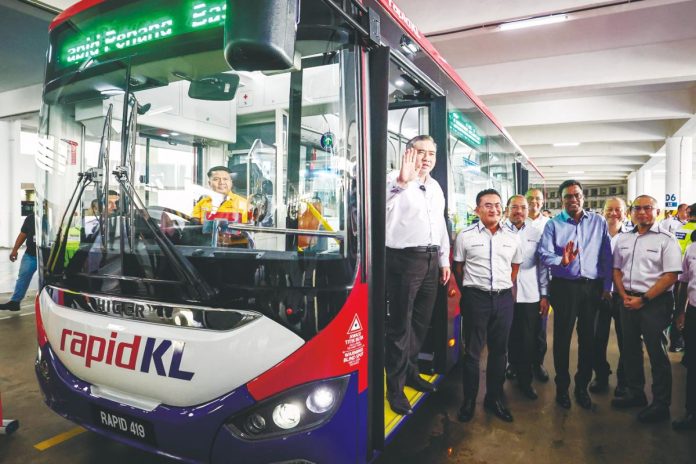KUALA LUMPUR: Keretapi Tanah Melayu Bhd (KTMB) is expected to gradually reduce its reliance on government funding as it improves operational efficiency, according to Transport Minister Anthony Loke.
He said the government-linked company still depends heavily on government funding to sustain its daily operations.
“There is indeed a shortfall in operational costs,“ he said at the unveiling ceremony of new diesel buses at the Rapid Bus Complex Batu Caves today.
Loke said KTMB’s commuter services are operating at a loss.
“If we want to achieve profitability, we would need to raise prices to a sustainable level. However, will the public accept this? As a government-linked company, KTMB has a social responsibility to consider,” he said.
Loke stressed the need to improve KTMB’s operations, especially the commuter services. “We hope that it will become more efficient, and, over time, our funding gap will be reduced.”
However, Loke noted that the railway company is making a profit from its cargo operations.
“KTMB operates under a cross-subsidy framework. What we get from the cargo side, from ETS (electric train service), is used to cover commuter services,“ he explained.
Loke said KTMB’s immediate focus is on improving operations, not on short-term profitability. “Of course, we hope that it can be financially sustainable, but that is not our immediate consideration right now.”
KTMB has not reached profitability, the minister said. “In terms of operations, we have not yet reached profitability, not even a break-even point.”
In April 2023, Railwaymen Union of Malaya president Muhammad Faizal Shahibul Kiraya said KTMB will continue to incur losses if it does not get more cargo trains, adding that the railway company has been in the red for about 30 years.
In 2024, it was reported that government grants to cover KTMB’s funding gap increased from RM180 million in 2022 to RM305.7 million in 2023, highlighting ongoing deficits.
At the event today, Rapid Bus Sdn Bhd, a subsidiary of Prasarana Malaysia Bhd, accepted the final batch of diesel buses under its bus replacement programme, which will play a crucial role in strengthening public transport in the Klang Valley and Penang.
The purchase of 310 diesel buses is part of an ongoing initiative to upgrade and enhance the country’s public transport system. The programme aims to replace older buses that have been in operation for many years, with phase-in operations from the end of this month until the first quarter of 2026.
Prasarana COO Amir Hamdan said the acceptance of this final batch of buses is part of Prasarana’s strategic transition plan to ensure the continuity of efficient and safe public transport services.
“While we are planning a shift to electric buses in the future, these diesel buses are crucial to meet current operational needs. This initiative also aims to replace old buses that can no longer meet current operational plans, thereby improving the user experience.
“At the same time, we remain committed to achieving long-term sustainability through the introduction of electric buses, which are scheduled for 2026,“ he said.
The new 12-metre buses can accommodate 60 passengers, meeting current demands and enhancing connectivity in the Klang Valley and Penang, where passenger demand is increasing.
In addition, in the third quarter of 2025, Rapid Bus will introduce 8.9-metre buses to expand public transport access to densely populated and residential areas that are difficult for larger buses to reach.
All of these new buses comform to the Euro 5 emission standard, the latest international pollution control benchmark.
With this technology, Rapid Bus aims to reduce nitrogen oxide emissions that degrade air quality, contributing to a cleaner urban environment.
Rapid Bus’ long-term plan includes the introduction of electric buses, which is expected to begin in 2026. This initiative is supported by the construction of charging facilities, as well as ongoing technical training and maintenance efforts.








